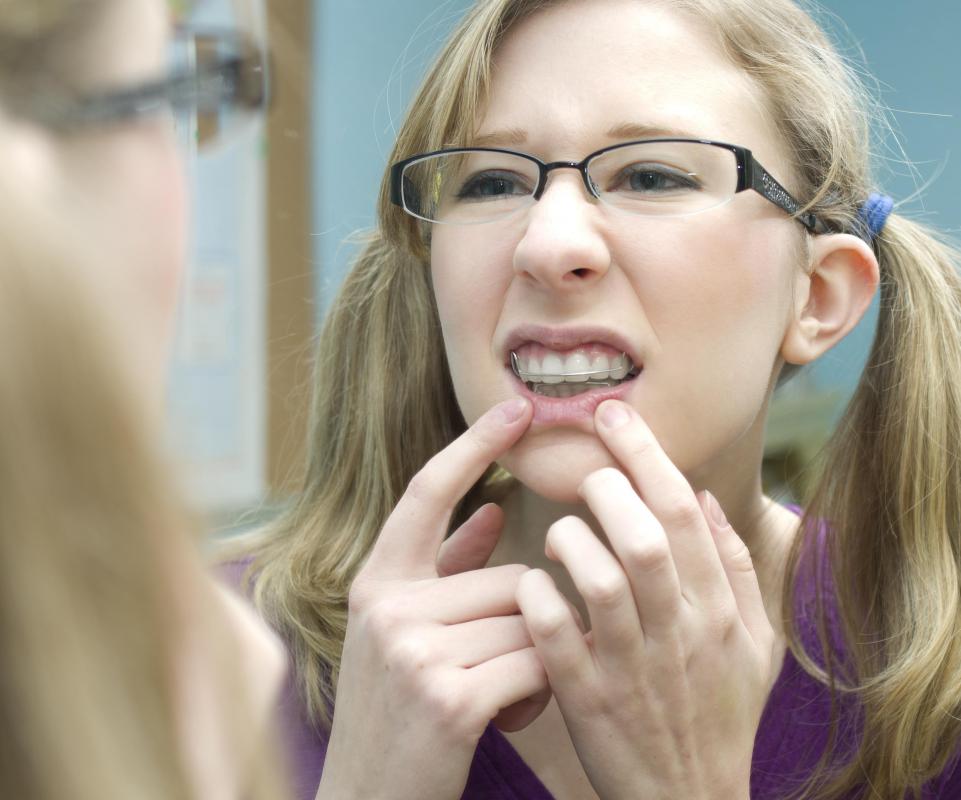At WiseGEEK, we're committed to delivering accurate, trustworthy information. Our expert-authored content is rigorously fact-checked and sourced from credible authorities. Discover how we uphold the highest standards in providing you with reliable knowledge.
How Do I Choose the Best Toothbrush for Braces?
Food has a way of getting wedged between teeth, especially if you have braces. A chunk of food jammed in your braces might cause discomfort, dental problems such as cavities and plaque or even embarrassment. That's why finding the right toothbrush for braces is so important — although it often takes some trial and error. Talk to your dentist or orthodontist about the best toothbrush for your personal needs.
Some dental experts recommend using a manual soft-bristled toothbrush for braces, and others say that patients should use strong battery-powered toothbrushes. Most practitioners, however, agree that all patients should brush for at least two minutes, twice a day, with a fluoride-rich toothpaste. Listen to your healthcare provider's opinions on the various types of toothbrushes, then experiment with several brushes until you find one that keeps your teeth clean and pain-free.

Many patients who have orthodontics find that a manual soft-bristled brush is the best toothbrush for braces. Soft-bristled brushes are available in a variety of colors and designs. They gently scrub away sugar particles and pieces of food, reducing the risk of cavities and gum disease. The downside is that a manual toothbrush does not have one set speed, increasing your odds of accidentally knocking some of your brackets loose by brushing a bit too hard. You also might notice that a manual brush causes your gums to hurt or bleed.

If brushing with a manual soft-bristled brush doesn't sound like something that you want to do, you might prefer a battery-powered or electric brush. Some experts believe that the set speed of an electric toothbrush makes it easier to clean teeth and brush around orthodontics, lowering the risk of damaging your braces or gums. If you choose an electric or battery-powered toothbrush, look for a model that automatically runs for two minutes. It's a lot easier than setting a timer or singing a song that you think is about two minutes long.

Both of these types of toothbrushes usually can be found at drugstores, pharmacies, department stores and other retailers that specialize in personal hygiene products or basic household goods. Remember to use a toothpaste that contains fluoride and brush at least twice a day — more often if possible. Try to brush after every meal, especially meals that involve sweet treats or sugary beverages such as soda. Owning the best toothbrush for braces won't do you any good if you never remove it from the fancy toothbrush holder on your bathroom counter.
AS FEATURED ON:
AS FEATURED ON:













Discussion Comments
@serenesurface-- I use one and I do recommend it. It's an orthodontic braces toothbrush made by a well known toothbrush brand. The brush itself is long and narrow so it's easy to move around teeth. And the bristles get into the braces and remove food particles very nicely.
I actually discovered this brush recently. I wish I had found it before. I think it's much better than a regular brush. It's not more expensive than a nice, quality brush either. So I think it's worth it. I plan on using it for as long as I have braces on.
I've heard that there are toothbrushes out there made specially for people wearing braces. Has anyone used one before? Would you recommend it?
I used an electric toothbrush for a while. They did clean well, but the battery eventually died and the brush needed to be replaced. So I ended up getting a regular, manual toothbrush and have been using that since.
I think that electric toothbrushes are best for breaking away plaque. But with braces, the bigger issue is getting food particles out of the braces. And I think it's easier to maneuver soft manual brushes in and around the braces.
Moreover, braces cause brushes to wear out more quickly and it's cheaper to replace a manual brush than an electric brush head and its batteries.
Post your comments